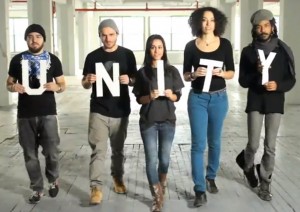
In last week’s article, I talked about a need for klal yisrael—or Jewish unity—and how Jewish languages are ultimately not great means for fulfilling this goal. While I didn’t have anything else to say about this once I finished writing, I kept thinking about it afterward: is a Jewish unity really possible, or are we too divided? And if it is possible, what means can we use to achieve it?
In my post, I discussed how attempting to connect to Jewish identity through Ashkenazi, Sephardi, or Mizrahi culture is mistaken, because these cultures are by nature sectionalized. If not through culture, then in what other ways could we connect to Jewishness? An obvious answer seems to be religion. But this is, by nature, also exclusionary toward certain Jews. Even if every Jew were religious, in forming our entire Jewish identities based upon religious principles we inevitably sectionalize ourselves. In his thought-provoking piece earlier this week, Amram Altzman discussed the value of religious labels—even religious labels that exclude others—in order to find a meaningful community.
Though I could see its merits, my first reaction to Altzman’s views was to disagree, to say that we shouldn’t be focused on what makes us different. Then I thought about how much I value my minyan, which specifically calls itself “Egalitarian.” Even though we make an effort to be relatively “non-denominational” within Judaism, “Egalitarian” is itself a label, one that, perhaps paradoxically, excludes some. Yet, I cannot say that we should do away with the differences in religious practices because of the power this service has for me; Friday night at Hillel is when I feel the most Jewish. As I think about it though, I realize that while this is in part due to service with my minyan, it is also significantly because of what happens after the evening service, when the minyans of different denominations come together to eat, schmooze, and sing, regardless of our religious denominational differences. Without this second part, I doubt Friday nights would make me feel as Jewish as they do.
Furthermore, if I had to pick one other instance of feeling most Jewish, I would choose my experiences in high school with Friendship Circle, and in particular interacting with other Friendship Circle volunteers. Our volunteer base was made of Jews from all backgrounds: Orthodox, Conservative, Reform, non-religious, Ashkenazi, Sephardic, Mizrahi, Jews-by-Choice, and the list goes on. We were, however, able to put the differences aside not only in our work to make a more tolerant community for individuals with special needs, but in our friendships with each other. Some of my favorite memories from my teenage years were Friendship Circle volunteer Shabbat dinners; there was never any pressure to practice any form Judaism other than our own, and despite belonging to different religious communities, we were able to enjoy Shabbat together, enjoy a meal together, and enjoy each other’s company.
I would not tell any of my more religious friends, or any of my less religious friends—either at Hillel or at Friendship Circle—to abandon their religious practices, nor am I willing to do so myself. I suppose in the same way, though it should not be synonymous with my Jewish identity, I am likewise unprepared to abandon my Ashkenazi roots, nor do I expect any Sephardic or Mizrahi Jews to do the same. Perhaps Jewish identity is in part made up of these splintered groups, but it also must have an aspect transcending this. It is this transcendent commonality that makes us Jews. We are different, yes, and Jewish unity does not mean ridding ourselves of these differences or ignoring them. It does mean, however, finding ways to meaningfully relate to each other despite them, and to understand that we are all a part of the same people. For me, this has happened over Shabbat dinner, but I don’t think that it must happen this way. Even culture, though influenced by specific sectionalized traditions, shouldn’t be ruled out, as long as it somehow mines its origins to create something that represents a pluralistic Jewish society. Ultimately, I don’t think that there is a singular means that we must use to achieve Jewish unity, but I do think that we can do it as long we can relate meaningfully to Jews different than ourselves.
Dani Plung is a student at the University of Chicago.
